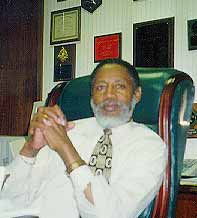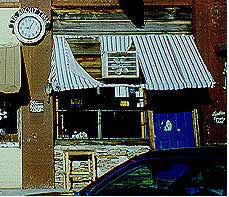|
Mayor Quitman Mitchell
While speaking with Claire
Mitchell, owner of the Bessemer
Beauty Institute, we learned that her husband had once served as the first
black man on the Jefferson County Barber Commission. Because of the obvious
connection to our project, we decided to speak with him. We met with Mayor
Mitchell in his office in Bessemer.

Mayor Mitchell
"And that was the beginning..."
As a boy, Mr. Mitchell would often watch
his father cutting hair out of their home. This was a frequent occurrence;
his father had many regular clients. One morning, a man came by for a
haircut, but Mr. Mitchell's father was busy. The man, who did not want
to pay the high prices of a regular barber shop,
said that the boy could cut his hair. After that morning, more men began
allowing the young Quitman Mitchell to cut their hair, "and that
was the beginning" of Mr. Mitchell's barbering days.
"I can do that."
When Mr. Mitchell entered high school, he did not originally choose to
take a course on barbering. However, when his friends did not like their
chemistry class and decided to take something else, Quitman Mitchell decided
to go with them. They had several choices, from drycleaning to butchering
to barbering. When Mr. Mitchell heard the instructor mention barbering
as an option, he said, "I can do that." However, the school
had never had anybody apply for barbering courses, so their facilities
were quite limited and their barbering instructors were non-existent.
And, "the law at the time would not permit me to walk into a barbershop
and work until I had a certain number of hours, you know, amount of schooling."
With the help of a teacher from his high school, he was finally able to
persuade the commission to let him work. He took a job at the 20th Century Barbershop,
which had been around for many years. He eventually became the owner of
the shop, and worked there for 34 years before leaving when he became
the Mayor of Bessemer in 1998.
Through the years, his barbershop was able to advance and remain successful because he regularly attended workshops.
Through these workshops, he learned "not just to cut hair," but to style hair; he learned what the latest
chemical treatments were and how to use them.

|

The 20th Century Barbershop in Bessemer
"They didn't have a better choice..."
As President of the Local Unit No. 1 of the Independent Barbers Association of Jefferson County, Mr. Mitchell held
a fair amount of weight in the affairs of his fellow barbers. He had once helped a friend of his run for the Jefferson
County Barber Commission, but his friend did not win. "It gave me the idea," he remembers, "after
helping them, that maybe if I run I could possibly win." It was an all-white commission, but "the other
guy who was running, they didn't want him. They didn't want me, either, but they really didn't want him. They didn't
have a better choice, so some of them supported me and I was able to win." He was elected to the Jefferson
County Barber Commission in 1973.

"Throughout the 19th century, barbering was their [blacks] most prestigious
occupation, and community leaders often were barbers who operated downtown barbershops that catered to the city's
elite." (Glasco)
Mr. Mitchell is a prime example of the high esteem enjoyed by barbers in the
African American community.
|

